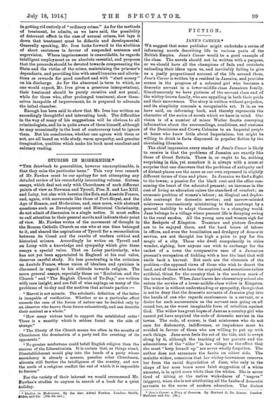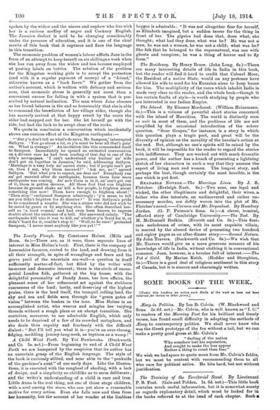FICTION.
JANE'S CAREER.*
WE suggest that some publisher might undertake a series of informing novels describing life in various parts of the British Empire. Jane's Career would be a good example of the class. The novels should not be written with a purpose, or we should have all the champions of fads and crotchets unloading their ideas upon us, and inevitably failing to give us a justly proportioned account of the life around them. Jane's Career is written by a resident in Jamaica, and provides scenes in the progress of a coloured girl who becomes a domestic servant in a lower-middle-class Jamaican family. Simultaneously we have pictures of the servant class and of the whitey-brown family, who are appalling in both their pride and their narrowness. The story is written without prejudice, and its simplicity conceals a recognizable art. It is, as we have said, an informing book, and thereby represents the character of the series of novels which we have in mind. Our vision is of a number of minor Walter Scotts conveying information about the surroundings, conditions, and customs of the Dominions and Crown Colonies to an Imperial people at home who know little about Imperialism, but might be willing to drink in facts dispensed in popular fiction by the circulating libraries.
The chief impression every reader of Jane's Career is likely to receive is that the problems of Jamaica arc exactly like those of Great Britain. There is, or ought to be, nothing surprising in this, yet somehow it is always with a sense of surprise that one discovers that the problems of antiquity and of distant places are the same as our own expressed in slightly different terms of time and place. In Jamaica we find a flight to the towns ; a passion for the black coat and the office con, sinning the heart of the educated peasant; an increase in the cost of living as education raises the standard of comfort; an economic problem of women's labour; an illogical and, deploy. able contempt for domestic service; and narrow-minded mistresses unconsciously ministering to that contempt by a general inability to adapt themselves to a changing world. Jane belongs to a village where peasant life is decaying owing to the rural exodus. All the young men and women sigh for the fleshpots of Kingston. Tramcars and picture theatres are to be enjoyed there, and the bard hours of labour in offices, and even the- humiliation and drudgery of domestic service, are not thought too high a price to pay for the magic of a city. Those who dwell compulsorily in cities wonder, sighing, how anyone can wish to exchange for the racket of a town the comparative ease of a Jamaican peasant's occupation of tickling with a hoe the land that will smile back a harvest. But such are the elements of the problem—the opposed views of those who wish to desert the land, and of those who have the acquired, and sometimes rather artificial, thirst for the country that is the modern mark of the town-dweller. When Jane leaves her elementary school she enters the service of a lower-middle-class widow in Kingston. The widow is without understanding or sympathy, though that is not to deny that the domestic servants of Jamaica play into the hands of one who regards carelessness in a servant, or a desire for such amusements as the servant sees going on all round her, as the worst imaginable form of rebellion against God. The widow has great hopes of Jane as a country girl who cannot yet have acquired the code of domestic service in the towns. Tho code, of course, is that mistresses who do not care for dishonesty, indifference, or impudence must bs avoided in favour of those who are willing to put up with such things. Jane soon feels the set of the tide, and is swept along by it, although the teaching, of her parents and the admonitions of the " elder " in her village to the effect that she must " keep herself up " are never wholly forgotten. The author does not extenuate the faults on either side. The mulatto widow, conscious that her whitey-brownness removes her from the racial degradation of Jane, who only in the shape of her nose bears some faint suggestion of a white ancestor, is in spirit more white than the whites. She is never tired of tilting at the native wickedness of " nagers " (niggers), when she is not attributing all the faults of domestic servants to the curse of modern education. The dialect • Jane's Career: a Story of Jamaica. By Herbert G. De Lieser. London-
Methuen and Co. Pe.] . _
spoken by the widow and the nieces and nephew who live with her is a curious medley of negro and Cockney English. The Jamaica dialect is said to be changing considerably under the pressure of education, and it is one of the chief merits of this book that it captures and fixes the language in this transition.
The economic problem of women's labour afflicts Jane in the form of an attempt to keep herself on six shillings a week when she has run away from the widow and has become employed at pasting labels on bottles. The solution of the problem for the Kingston working girls is to accept the protection (and with it a regular payment of money) of a "friend," otherwise known as a " back force." We gather from the author's account, which is written with delicacy and serious- ness, that economic stress is generally not more than a convenient excuse for falling in with a system that is pre- scribed by natural inclination. The man whom Jane chooses as her friend behaves in the end so honourably that she is able to command the benediction of her village elder, though she has scarcely arrived at that happy result by the route the elder had mapped out for her. She let herself go with the tide, but had the luck to be swept clear of the rocks.
We quote in conclusion a conversation which incidentally shows one curious effect of the Kingston earthquake :— "'But y'u don't tell us what's de news, Mr. Sampson,' interrupted Satbyra. You go about a lot, so y'u must be hear all that's goin' on. What is strange ? ' An invitation like this commended itself to Sampson. Immediately he opened an animated conversation on a divorce case he had been reading of that day in one of the city's newspapers. can't understand why husban' an' wife don't get on together in Jamaica,' he said, addressing Sathyra. 'Marriage is a very holy an' sacred state ; but if people can't get on, then I say, why them married ?" Ask me, no !' agreed Sathyra. 'But what you to expect, me dear sir? Everybody run an' get married after de earthquake, because them hear more earthquake was coming. An' now them is in it, an' can't get out of it, them is getten divorce. All those fool that was frighten because de ground shake an' kill a few people, is frighten about something else now ! Them have enough to frighten about ' 'Then stop!' exclaimed Sampson admiringly ; 'y'u mean to tell me you didn't frighten for de disaster ? ' It was Satbyra's pride to be considered a sceptic. She was a sinner who did not wish to be saved by grace or by anything else. She often described her- self as 'a hard woman,' and had even been known to express
doubts about the existence of a hell. She answered The earthquake kill who it was to kill, an' whether y'u 'fraid for it, or didn't 'fraid for it, couldn't stop it." Well, to be sure!' protested Sampson, never meet anybody like you yet !'"











































 Previous page
Previous page